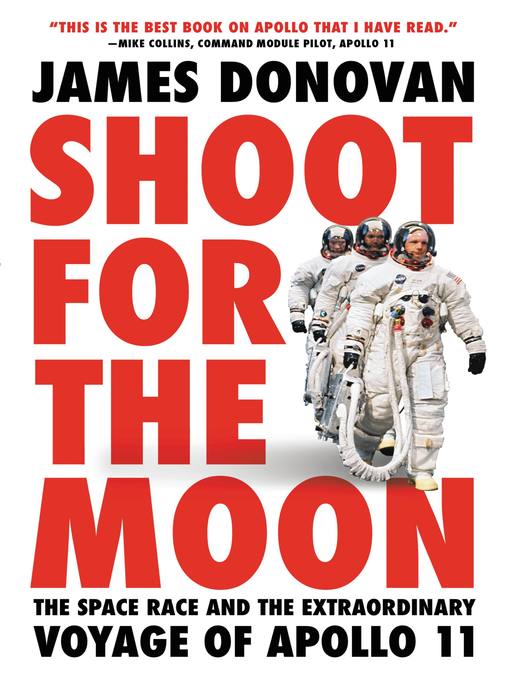
Shoot for the Moon
The Space Race and the Extraordinary Voyage of Apollo 11
کتاب های مرتبط
- اطلاعات
- نقد و بررسی
- دیدگاه کاربران
نقد و بررسی

December 1, 2018
The tale of America's journey to the moon still ignites the imagination of people worldwide a half-century later. Donovan (The Blood of Heroes) recounts the saga of the space race and the journey to the moon by describing the political motivation for developing a space program, specifically the perceived threat by the Soviet Union of the spread of communism and a nuclear attack. After capturing Wernher von Braun and his team of German engineers who designed the lethal long-range ballistic missiles during World War II and assimilating them into NASA, the United States was able to develop a rocket capable of launching a spaceship. Donovan then documents the Mercury and Gemini missions that were necessary to prepare astronauts for voyaging and working in space. He concludes with the Apollo missions and the historic landing on the moon by Neil Armstrong, Buzz Aldrin, and Michael Collins. VERDICT Although there are a number of books chronicling the Apollo 11 moon landing, Donovan's account offers new interviews and extensive research in an accessible and engaging read, appealing to those without extensive knowledge on the subject.--Donna Marie Smith, Palm Beach Cty. Lib. Syst., FL
Copyright 2018 Library Journal, LLC Used with permission.

February 1, 2019
A vigorous exploration of the Space Age, a frontier oddly befitting Wild West historian Donovan (The Blood of Heroes: The 13-Day Struggle for the Alamo--and the Sacrifice that Forged a Nation, 2012, etc.).The year 2019 marks the 50th anniversary of the arrival of Apollo 11 on the moon and Neil Armstrong's famous "one small step" pronouncement. That history and the long chain of efforts leading up to the landing have been well-documented, not least by Tom Wolfe in The Right Stuff. Even so, Dallas-based historian Donovan finds fresh things to say about the events--as when, for instance, he recounts Buzz Aldrin's constant lobbying to be the first to set foot on the moon, a campaign that his peers found tedious but not entirely unseemly. That Armstrong was chosen to lead and then kept in that role, Donovan writes, strongly reflects a priority: "NASA wanted to make a clear statement about the non-military nature of the landing and of the American space program as a whole," and Armstrong was both a civilian and senior in the hierarchy, making him a natural choice. Aldrin was privately devastated but put up a brave front. In Donovan's hands, pioneering space scientist Wernher von Braun gets some deliverance from the Tom Lehrer school of lampoonery: True, he'd worked for the Nazis, but he also made remarks about the Hitler regime critical enough to be charged with treason, interrupting his perhaps unlikely playboy lifestyle. Just so, Donovan turns to small but meaningful episodes that speak volumes: NASA's grudging addition of various lunar experiments "for the science guys"; Aldrin's ministering of Communion by means of a tiny vial of sacramental wine that he smuggled aboard for the purpose; the fact that only by landing there could we be sure that "the moon's color...was various shades of gray." The author closes with the hopeful thought that after a long hiatus, we may soon be heading back into space.A welcome addition to the literature of space exploration.
COPYRIGHT(2019) Kirkus Reviews, ALL RIGHTS RESERVED.

Starred review from December 1, 2018
With NASA's recent announcement about a planned return to the moon coupled to fiftieth anniversaries of Apollo 8 and Apollo 11 and recent release of the movie First Man, profiling the late astronaut Neil Armstrong, interest in the long-retired Apollo space program has been undergoing an overdue revival. The best-selling author of works on the Alamo and the battle of Little Bighorn, Donovan combines his masterful research skills and narrative gifts in recounting the full story of the most famous Apollo trip, the one that delivered Armstrong and Buzz Aldrin to the moon's surface. Donovan begins with the 1957 launch of Sputnik, the tiny Soviet satellite that ignited the space race between the U.S. and Russia, and takes readers through the early days of failed rocket launches and orbiting monkeys before NASA began its Herculean efforts to realize President Kennedy's 1961 dream of landing men on the moon by the decade's end. In the often gripping chapters on Apollo 11, Donovan reveals many colorful details about behind-the-scenes pressures, such as an early argument between Aldrin and Armstrong about who goes first. Drawing on dozens of interviews with the era's engineers and scientists, Donovan's history is a powerfully written and irresistible celebration of the Apollo missions.(Reprinted with permission of Booklist, copyright 2018, American Library Association.)

























دیدگاه کاربران